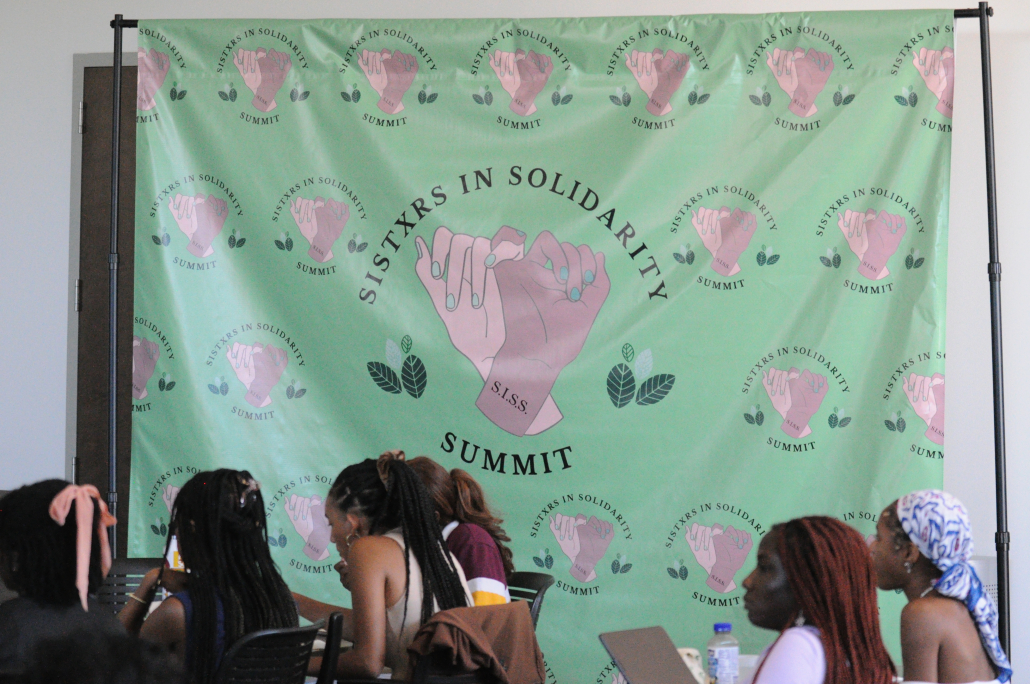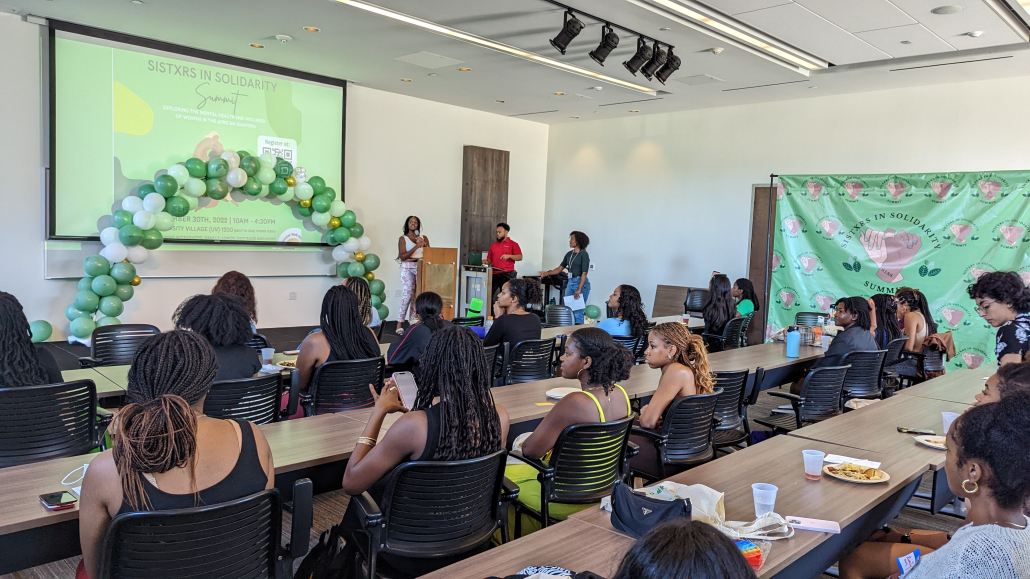
At USC Village on Friday morning, 40 to 50 Black women and nonbinary students repeated the affirmation, “Siss, you’re a vision of beloved Blackness.” The affirmation, led by Rossier School of Education clinical education professor Brinell Lynn Anderson, kicked off the “Sistxrs in Solidarity Summit.”
The Center for Black Students and Cultural Affairs hosted the summit, an event centered around supporting and celebrating the mental wellness of Black women at USC. The CBCSA held the event in partnership with the Department of Psychiatry, Viterbi School of Engineering, USC Black Alumni Association and Alpha Kappa Alpha.
Founded in 1977 under the Department of Campus Life, the CBCSA serves to connect the University and resources tailored to the Black community. The association’s primary goals are the retention of Black students and providing them necessary resources for academic success. The event is the second of its kind put on by the CBCSA, following a mental summit for men held last spring.
Split into three distinct sessions and an opening keynote speaker, each section focused on keying into one aspect of Black women’s experiences on campus in regards to mental health.
The keynote speaker, Anderson, started by asking attendees to focus on their motives for joining the summit, whether it be a recent struggle or a search for “the sister connection.”
Anderson’s speech was centered around “a vision of your beloved Blackness wellness through the lens of the dimensions of your African selves.” She noted the racial trauma that weighs on Black women, personally and collectively, but also encouraged attendees to see those experiences as a single part of a much richer identity.
Our story did not start with any of the oppression we see in modern times, in the brutality of police or injustices regarding mass incarceration. No, we are people rich with culture from the motherland.
Brinell Lynn Anderson, professor of clinical education at the Rossier School of Education
“Our story did not begin with our oppression,” Anderson said. “Our story didn’t begin with our kidnapping. Our story didn’t begin with the Middle Passage. Our story didn’t begin with our enslavement or reconstruction, terror or lynchings or Jim Crow. Our story did not start with any of the oppression we see in modern times, in the brutality of police or injustices regarding mass incarceration. No, we are people rich with culture from the motherland.”
Anderson encouraged the audience to envision their “African selves” through four dimensions: the personal self, the social self, the tribal self and the divine self.
As she discussed the “social self,” or the aspects of identity connected to people such as families and friends, Anderson highlighted the importance of cultivating relationships that allow their true and best personal selves to come out.
“The beauty of this dimension is we get to create connections which serve us and let go of ones which eat us alive,” Anderson said.
Anderson also introduced the “tribal self,” or the part of identity rooted in ancestry. Anderson said rituals are a common way to affirm the tribal self, and led the group in a libation ceremony to honor their ancestors. As Anderson poured libations, the audience called out ancestral names, responding to each in unison with the word “ashay,” meaning “so it is.”

After the keynote address, attendees participated in an hour-long sound bath conducted by Bloom Holistic Healing, a Los Angeles-based organization that harnesses experiences like sound baths and breathwork to promote natural healing. Attendees laid on yoga mats while the Bloom team led guided meditation and relaxation exercises. As a key part of the process, the team played high-frequency sounds with instruments including crystal bowls, Tibetan gongs, rain sticks and koshi chimes.
“The sound bath awakened so many parts of my body that I felt were lying dormant,” said Sasha Lawrence, a sophomore majoring in psychology who attended the event. “The sound bath interacts with your different energy centers along your body and I definitely felt mine come alive, so that was amazing.”
Lawrence said she has often found mental health stigmatized in the Black community and that it can be difficult to have “any experience with mental health” as a Black woman. She said she believes events like Friday’s summit break some of the barriers to needed conversations.
Black women are always expected to be strong, and it’s really frustrating because you can only hold the weight of the world for so long until you crack.
Sarah Lawrence, a sophomore majoring in psychology
“People don’t encourage you to get your feelings out, to cry and to be vulnerable,” Lawrence said. “Black women are always expected to be strong, and it’s really frustrating because you can only hold the weight of the world for so long until you crack. It’s been hard to find spaces where I’m able to talk about my mental health and be comfortable doing so. But that’s why we’ve created all these things, so that people are able to leave ancestral trauma behind and grow from that.”
Lawrence said that for self-care, she tries to find time to meditate, be in nature and explore flea markets.
Following the second session’s small group discussions on the perceptions of Black womanhood proctored by USC Student Health’s Counseling and Mental Health services, the summit reconvened for a final panel on mental wellness beyond college. Panelists included Culver City Councilwoman Yasmine-Iman McMorrin, former professor of business at the Marshall School of Business and head of global inclusion at Creative Arts Agency Sharoni Little and Dr. “Sunshine” Shalonda K. Crawford.
During the discussion, Crawford sought to redefine the classic understanding and stereotype of “strong Black women.”
“When we talk about strong Black women, there’s an expectation that we should bear beyond reason,” Crawford said. “I feel like a lot of us are bearing beyond reason [and] navigating life broken, overloaded, tired and smiling.”
Milan Fritz, a senior majoring in neuroscience and an undergraduate prospective advisor for CBSCA, echoed Crawford’s concern toward the stereotype.
“The idea behind Black women having to be strong is something that is a really big stigma in today’s society, and you’re not allowed to embrace our soft side. We have to keep up a persona and keep up an image that we’re strong, we can do it all,” Fritz said.

During her speech, Little spoke about the difficulty focusing she had as a student during her time at the University, which eventually landed her in academic probation. She began pursuing her undergraduate degree at 16 years old after graduating from high school a year early in Compton, California. While her academic abilities spoke for themselves, her mental aptitude was not yet mature enough, she said.
“I was still smart, but it had nothing to do with being a smart student. It was about doing what I needed to do, but I was developmentally not ready,” Little said. “Sometimes, we’re in situations where we’re just not there yet, but we try to force through … Don’t do that to yourself.”
Sometimes, we’re in situations where we’re just not there yet, but we try to force through … Don’t do that to yourself.
Sharoni Little, head of global inclusion at Creative Arts Agency
All three speakers also put a spotlight on their struggles and failures throughout the years, and the ways they’ve resolved those experiences in their current work.
“I started going to therapy in law school when I realized, ‘Oh, I need some tools in here,’” McMorrin said. “Therapy is a major part of who I am, and the end is this journey and this work that I continue to do.”
Courtnee King, a community health organizer and graduate student studying public policy, said her experiences and struggles at Arizona State University shapes her current work.
“[At ASU], I felt it was more of, ‘We’re going to put students in leadership positions so that they can feel like leadership, but we’re not going to listen to them,’” King said. “So when I came here as a grad student, I really wanted to be a part of building experiences for undergrad.”
The CBSCA will continue to provide mental health outreach programs throughout the semester, including their bi-weekly “Health is Wealth” series.
The post Summit promotes mental health among Black womxn appeared first on Daily Trojan.
